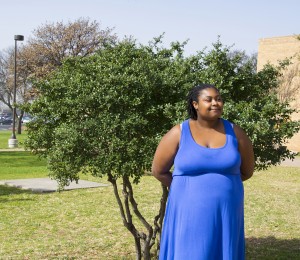By Dylan Bradley/ne news editor

It’s early enough that Subway hasn’t opened yet, and the NE Campus cafeteria is quiet. When the security gate rises, a few students filter through, leaving with coffee and breakfast. The employee working is tired but keeping his smile.
A tall light-skinned man with blonde dreadlocks walks into the room with a tall and curvy dark-skinned woman on his arm. As she slides into a booth, he leans in and kisses her cheek and then takes a seat a few booths away.
Keitia Jackson gives a small smile with full eye contact, then arranges her bags and a towering bari-sax case next to her seat. She digs out a smaller case from one of her bags and produces a pair of small purple earplugs.
Jackson has Asperger’s syndrome, a form of autism on the high-functioning end of the spectrum.
“I can’t filter out noise, so the fan in the next room is really distracting,” she explains. “But when I’m playing with a group, that actually comes in really handy to hear everyone.”
She also struggles with interpreting emotions others display and completely disassociates when she is overwhelmed.
Jackson and DeVonte Anderson met through NE Campus’ music program after a friend suggested they would make a good couple.
“I never thought anyone thought of me like that. I was just completely oblivious,” Jackson said, her eyes fixing on a spot on a far wall.
“He said he would date me a thousand times, and I was like, ‘Wait, what?’ After he had trumpet lessons, I texted him saying, ‘You will be my new boyfriend.’”
As soon as her eyes fix in one place, they start jumping around again, but her back is straight, and her hands are resting primly in her lap.
“I got lucky. He’s my first boyfriend, and now we’re engaged,” she said, flashing a smile.
Anderson, or Q, has faced many challenges himself. He has albinism and is legally blind. People with albinism have little or no pigment in their eyes, skin or hair.
He said he found being an albino African-American one of the hardest parts of growing up.
“It got me to question my identity so bad that my parents got a DNA test for me,” he said. “It gave me this inadequacy complex growing up.”
Very much Jackson’s opposite, he is talkative and outgoing, which she loves about him.
“I really like it when he talks about everything and listening to him,” she said.
One unique manifestation of Jackson’s autism is her almost constant hand-wringing, which explains why her hands are under the table so much. Jackson enjoys the motion and feel of it but also feels a need to do it when she’s nervous. While her parents thought she was just frequently anxious, Anderson can actually tell by the way she is wringing whether she is happy or nervous.
“If he sees me and I’m doing it, he says, ‘Oh, I see you’re in a good mood,’ or he’ll ask me if I’m nervous,” she said.
Anderson said when she gets excited, she does rapid hand movements, and when she’s shy, she holds them really close to her chest.
“When she’s angry, she does claw motions that are much more harsh and slow,” he said.
After four years of dating, Anderson proposed.
“I knew I wanted to marry her two years into the relationship,” he said. “I just didn’t have the means to buy her a ring.”
The wedding is Aug. 2, but the couple decided not to go on a honeymoon. Jackson said her parents never had one, so it really isn’t necessary.
“We don’t have a lot of money, and it’s not really anything that’s important,” she said. Anderson said he agrees, saying starting out on their own was much more important than a vacation they can always take later.
In the future, Jackson hopes to teach special education. She was diagnosed with Asperger’s when she was 14 and still stays in contact with one teacher that helped her most. She hopes to make a difference in as many children’s lives as possible, as her teacher helped her.
However, she worries about having her own children.
“We haven’t decided for sure yet,” she said. “He is as afraid as I am of passing on his blindness and albinism as I am of passing on my autism.”
Sitting in the cafeteria nervously wringing her hands, her accomplishments seem to fade in the face of future challenges.
“I just tell myself I’m going to be OK, and that I can do this,” she said. “I’m already ahead just because I know what the problem is, and it can’t stop me.”
One of the ways Jackson unwinds is by playing games, her favorite being Pokemon.
“We play Pokemon together,” her friend Natalie Lopes said. “She’s a really good listener.”
She said that they play against each other occasionally, but mostly they play side by side and help each other.
As more students begin to fill the cafeteria, Jackson rises from the table to collect her belongings. Anderson appears out of thin air to help, and they navigate out of the room arm in arm. They both have more obvious weaknesses than the average student, but the only thing visible is their combined strength and committed love.
























